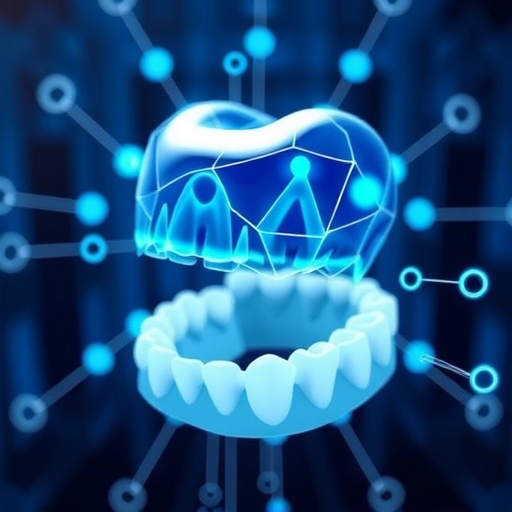In recent years, the integration of artificial intelligence (AI) into various fields has sparked significant interest, particularly within the realm of education and professional training. A recent study conducted by a team including Shrateh, O.N., Al-batat, S., and Al-Qudimat, A.R. delves into the perceptions and attitudes of dental students towards this evolving technology. By exploring how future dentists view AI, the research provides valuable insights that could shape educational practices in dentistry and beyond.
As the functionality of AI continues to expand, its applications in healthcare have become increasingly prevalent. Specifically, in dentistry, AI technologies are being explored for diagnostic assistance, treatment planning, and improving operational efficiencies. The implications of adopting AI tools are profound; they promise not only to enhance the accuracy of diagnostics but also to streamline workflows, providing students and practitioners alike with an unprecedented level of support in their clinical decisions.
The study, which will be published in BMC Medical Education, highlights the necessity of understanding how dental students perceive AI. Attitudes towards evolving technologies can significantly influence the adoption of such tools in professional practice. This research evaluated various factors, ranging from students’ knowledge of AI to their overall comfort level with technology in clinical settings. Such an evaluation is vital, as dental education continues to adapt to technological advancements.
With the advent of AI, the landscape of dental education is shifting. Traditionally, dental students have relied heavily on fundamental theoretical knowledge and manual skills development. However, the rise of AI-enabled technologies necessitates that curricula evolve to address new methodologies. The study reveals that many dental students recognize the potential benefits of AI, while also expressing concerns about the ethical implications and the potential for over-reliance on technology in clinical practice.
The researchers employed a survey methodology to capture the diverse attitudes of dental students across various educational institutions. The findings reveal a compelling dichotomy; while many students are excited about the possibilities AI presents, there exists a significant cohort that remains skeptical. These reservations are not based on a lack of understanding but rather a fear of how AI might change the dynamics of patient care and professional responsibilities.
Furthermore, the study notes that the integration of AI into clinical settings could lead to a shift in the nature of patient-dentist interactions. As AI can handle increasingly complex tasks, there is a legitimate concern that patients may prefer technological assessments over human expertise. This raises essential questions regarding the role of practitioners in a tech-driven future and whether their skills could become superseded by algorithms.
An intriguing finding of the study is the impact of students’ academic backgrounds on their attitudes towards AI. Those with a stronger foundation in technology-oriented courses seemed to exhibit a more favorable view of AI’s role in dentistry. Conversely, students lacking such exposure often expressed doubts, emphasizing the need for educational programs to foster technological fluency alongside traditional clinical skills.
Moreover, as dental schools begin to incorporate AI training into their curriculums, the students’ readiness to engage with these technologies becomes paramount. The research highlights a gap in existing dental education programs that often overlook the importance of familiarizing students with AI tools and their applications. Bridging this gap is essential to prepare future dentists for a landscape where AI is not just a novelty but a necessary component of practice.
In addressing the ethical considerations surrounding AI, the study compels educational institutions to prioritize discussions on the implications of machine learning and data privacy. As AI systems become more prevalent, dentist training must include a strong ethical framework to navigate the challenges they pose. The incorporation of case studies and real-world applications of AI may serve as effective teaching tools in fostering critical dialogue among students.
Social perceptions of AI also play a pivotal role in the integration of these technologies in dental practice. The research highlights how societal attitudes towards AI can influence student perspectives. For some, the media’s portrayal of AI as an all-knowing entity instills both wonder and apprehension. Dismantling these misconceptions through enhanced education and open communication is necessary to cultivate a generation of dental professionals that can leverage AI responsibly.
As the future unfolds, it becomes increasingly essential for dental educators to focus on interdisciplinary collaboration. The integration of AI tools necessitates a systematic approach that transcends traditional boundaries, encouraging students from various fields such as computer science, ethics, and social sciences to engage with dental education. Such collaborations could pave the way for innovative solutions that enhance the delivery of dental care while respecting the core tenets of patient-centered care.
In conclusion, the research conducted by Shrateh, Al-batat, and Al-Qudimat sheds light on a critical juncture in dental education. As AI continues to shape the healthcare landscape, understanding students’ attitudes and perceptions will be vital in fostering an environment that embraces technological adoption while addressing inherent concerns. Preparing future dental professionals to navigate this new terrain will not only enhance patient care but also ensure that the ethical and professional standards of dentistry are upheld.
As we stand on the precipice of a new era in dental education and practice driven by artificial intelligence, the findings from this study illustrate the importance of dialogue, education, and collaboration. Embracing AI with an informed approach will determine the trajectory of dentistry in the years to come.
Subject of Research: Attitudes and perceptions of dental students towards artificial intelligence.
Article Title: Attitudes and perceptions of dental students towards artificial intelligence.
Article References:
Shrateh, O.N., Al-batat, S., Al-Qudimat, A.R. et al. Attitudes and perceptions of dental students towards artificial intelligence. BMC Med Educ 25, 1386 (2025). https://doi.org/10.1186/s12909-025-07854-9
Image Credits: AI Generated
DOI:
Keywords: AI in dentistry, dental education, perceptions of AI, technology in healthcare, future of dentistry.




